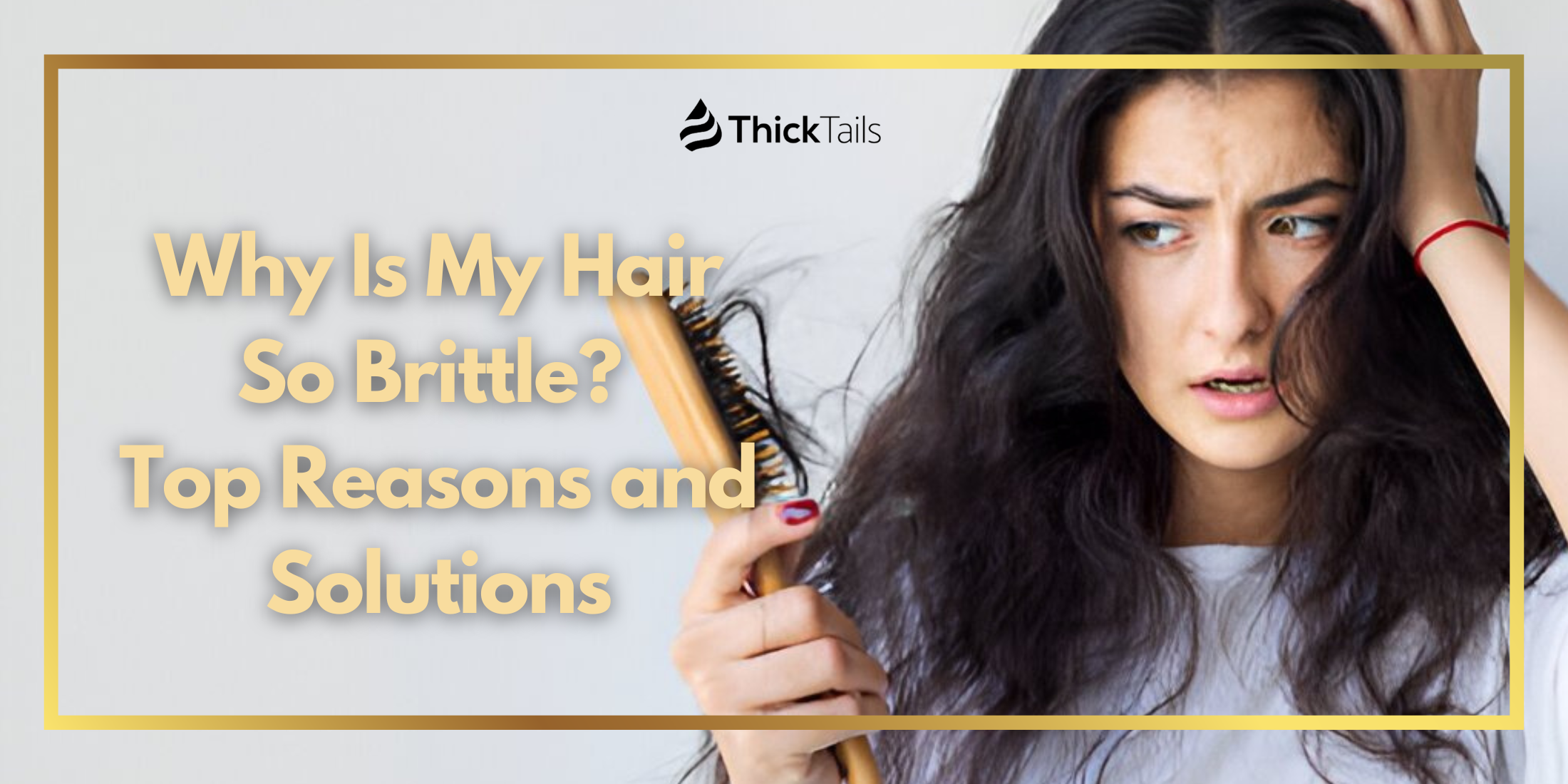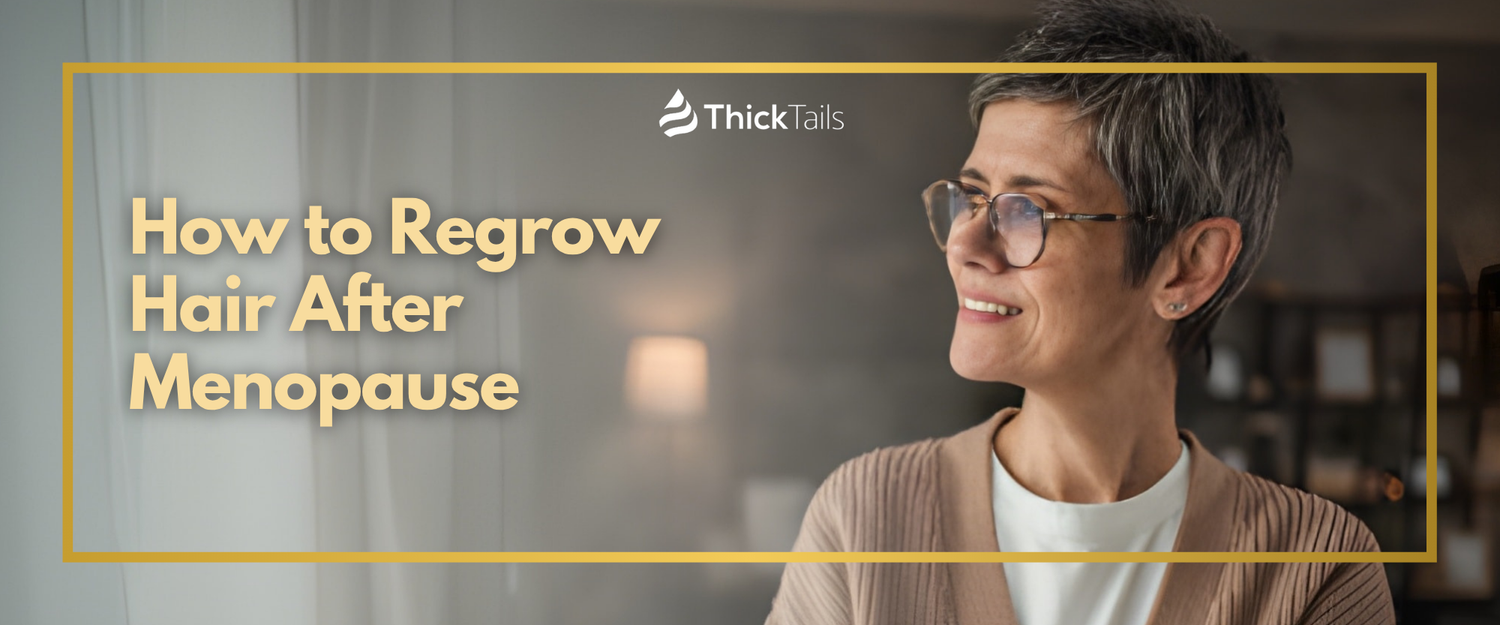As women, our bodies go through countless changes throughout our lives. From puberty to pregnancy to menopause, each stage brings its own unique set of challenges. And while we may be prepared for physical and emotional changes during these milestones, one thing that often catches us off guard is hair loss or brittle hair. Whether you're going through menopause, recovering from postpartum hair loss, or dealing with the effects of stress on your locks, understanding the reasons behind brittle hair can help you find solutions and regain confidence in your appearance. In this blog post, we will dive into the top reasons why your hair may be feeling more fragile than ever before and share practical tips for improving its strength and health. So grab a cup of tea (or coffee) and let's learn about why those strands on your brush are causing concern.
I. Common Causes of Brittle Hair

Brittle hair can be a frustrating problem to deal with, but identifying its common causes can help you address the issue head-on. One common cause is over-styling, particularly with heat tools or chemical treatments. Excessive use of these tools can dry out and damage your hair, leading to brittleness. Environmental factors like harsh weather conditions and pollutants may also contribute to the problem. Additionally, poor nutrition can weaken your hair, making it more prone to breakage. By understanding the causes of brittle hair, you can take steps to protect your locks and ensure they stay healthy and strong.
A. Environmental Stressors: Sun Exposure and Pollution
As we go about our daily lives, we are often exposed to environmental stressors that can take a toll on our bodies. Two of the most common culprits are sun exposure and pollution. For women, in particular, these stressors can result in brittle hair and other beauty concerns. While we may not be able to completely avoid sun exposure and pollution, there are steps we can take to minimize their impact on our bodies and beauty routine. Educating ourselves and taking preventative measures such as wearing sunscreen and using eco-friendly products can go a long way in protecting both our health and our hair. It's important to stay informed and take action to prioritize our well-being in the face of these environmental stressors.
B. Chemical Damage: Effects of Hair Dye and Relaxers
blike dye and relaxers are popular among women all over the world, but they can often come at a cost. One of the most common side effects of these treatments is brittle, damaged hair. Overuse or improper application can lead to breakage and split ends, leaving hair looking dull and lifeless. While these treatments can be convenient and offer a change in appearance, it's important to be aware of their potential negative effects and take steps to minimize damage. So whether you're considering a new hair color or straighter locks, make sure to do your research and consult with a professional to ensure optimal hair health. Remember, healthy hair is beautiful hair.
C. Heat Styling: The Impact of Blow Dryers, Curling Irons, and Straighteners
Heat styling tools like blow dryers, curling irons, and straighteners have become an essential part of many women’s hair care routines. However, excessive use of these tools can wreak havoc on the hair. Constant exposure to heat can cause the hair to become brittle and lose its natural shine. This is especially true for women whose hair is already prone to damage due to chemical treatments or excessive styling. It’s important for women to be aware of the impact that these tools can have on their hair, and to take preventative measures to avoid damage. One way to minimize damage is by using a heat protectant spray or serum that acts as a barrier between the hair and the heat source. It’s also important to limit the use of heat styling tools, and to allow the hair to air dry as much as possible. With proper care, women can still achieve the hairstyles they desire while maintaining healthy, beautiful hair.
II. Nutritional Deficiencies and Health Factors
Nutritional deficiencies can have significant impacts on one's overall health, particularly when it comes to women. One such signal of poor nutrition is brittle hair, which can indicate a lack of essential vitamins and minerals. While it may seem like a small cosmetic issue, brittle hair can be indicative of larger health concerns. It's important to pay attention to these signs, as the body may be trying to alert us to inadequacies in our diets. Women, in particular, are more susceptible to certain nutritional deficiencies due to the physiological demands of their reproductive systems. Understanding the relationship between diet and health is crucial, and can help us to lead happier, healthier lives.
A. Lack of Essential Nutrients: Vitamins and Minerals for Hair Health
Hair is an important aspect of our physical appearance, and for women, it can evoke a sense of confidence and identity. However, when brittle hair becomes an issue, it can affect our overall appearance and self-esteem. Brittle hair is often a result of a lack of essential nutrients, such as vitamins and minerals. Hair supplements can provide the necessary nutrients to promote overall hair health. While genetics play a role in hair health, proper nutrition is essential for supporting healthy hair growth. It is important to incorporate a balanced diet and hair supplements into our daily routine to maintain healthy and strong hair.
B. Hydration Deficit: Importance of Water for Strong Hair
Dehydration can do more than just leave you feeling thirsty. Did you know that not drinking enough water can lead to brittle, weak hair? This is especially important for women, who often put their hair through a lot of stress through heat styling, color treatments, and other damaging practices. Without proper hydration, your hair can become dry and prone to breakage, ultimately hindering your efforts to achieve healthy, strong hair. By drinking plenty of water and staying hydrated, you're not only doing your body a favor, but you're also providing essential moisture to your hair for a healthy, lustrous appearance. So next time you reach for your favorite beverage, consider reaching for a glass of water instead. Your strands will thank you.
C. Underlying Health Conditions: Thyroid Disorders and Hormonal Imbalances
Thyroid disorders and hormonal imbalances are two health conditions that can greatly affect a person's quality of life. While these issues can affect both men and women, hormonal imbalances are often more prevalent in women. One of the key symptoms of these conditions is brittle hair. This can be attributed to the effects of hormones on the body's natural balance, which can impact everything from our mood to our physical health. Understanding how these conditions affect us is an important step in managing our health and avoiding more serious complications down the road. If you are concerned about your thyroid or hormone levels, talk to your doctor or healthcare provider today.
III. Effective Solutions for Stronger, Healthier Hair

For many women, brittle hair can be a challenge to maintain. It can feel like an uphill battle to achieve healthy, strong locks, but luckily there are effective solutions available to help. One option is to use nourishing hair products that contain ingredients like keratin, biotin, and omega-3 fatty acids. These nutrients can help strengthen hair from the inside out, leaving it less prone to breakage and damage. Other solutions could include regular trims to remove split ends, avoiding excessive styling with heat tools, and protecting hair from UV rays by wearing a hat or using a leave-in conditioner with SPF. As with any aspect of self-care, finding what works best for you may take some experimentation and patience, but the end result of healthier, stronger hair will be well worth the effort.
A. Nourishing Hair Treatments: Deep Conditioners and Hair Masks
While shampoo and conditioner are essential for maintaining healthy hair, sometimes our tresses need a little extra TLC. Women with brittle hair, in particular, may benefit from nourishing hair treatments such as deep conditioners and hair masks. These products penetrate deep into the hair shaft, delivering essential nutrients and hydration to strands that may be lacking in moisture. Applying a hair serum afterwards can further enhance the benefits of these treatments, leaving hair looking and feeling soft, shiny, and revitalized. Incorporating deep conditioners and hair masks into your hair care routine can make a noticeable difference in the health and appearance of your locks.
B. Protective Styling: Techniques to Minimize Breakage
Brittle hair is a common issue that women face, especially when they engage in harsh hair practices such as frequent heat styling or chemical treatments. Fortunately, protective styling can help minimize breakage and promote healthy hair growth. Protective styling refers to hairstyles that keep the ends of your hair tucked away and protected from external damage. These hairstyles can include braids, twists, buns, and even wigs or weaves. By protecting the hair from friction and exposure, protective styles reduce the likelihood of split ends and breakage. Additionally, they also give your hair a break from daily styling, which can help prevent further damage. By incorporating protective styling techniques into your hair care routine, you can enjoy stronger, healthier hair with less breakage.
C. Healthy Hair Habits: Proper Brushing, Washing, and Scalp Care
Healthy hair habits are essential for maintaining strong and luscious locks. It's especially crucial for women who use shampoo and conditioner regularly. Proper brushing and washing techniques can strengthen your hair and improve its texture, while caring for your scalp can prevent dryness and other scalp issues that can cause brittle hair. Follow these healthy hair habits daily and keep stress and environmental factors at bay to have a healthy and beautiful mane. Remember, it's not just about the hair care products you use; it's also about how you take care of your hair and scalp that makes all the difference.
As we have learned, there are numerous factors that can contribute to brittle hair. Environmental stressors such as sun exposure and pollution, as well as chemical damage from hair dye and heat styling, can all take a toll on the health of our locks. Additionally, nutritional deficiencies and underlying health conditions can also play a role in causing brittle hair. But fear not, for there are effective solutions to help us achieve stronger and healthier tresses. Nourishing hair treatments like deep conditioners and masks can provide much-needed hydration and nutrients to our strands. Protective styling techniques like braiding or using satin pillowcases can minimize breakage, while healthy hair habits such as proper brushing, washing, and scalp care can also make a difference. So for all the women out there dealing with brittle hair, it's time to take action and implement these tips into our haircare routine. Let's give our locks the love they deserve and say goodbye to brittle hair for good. Remember, when it comes to healthy hair, knowledge is key, so keep educating yourself on how to best care for your mane!







